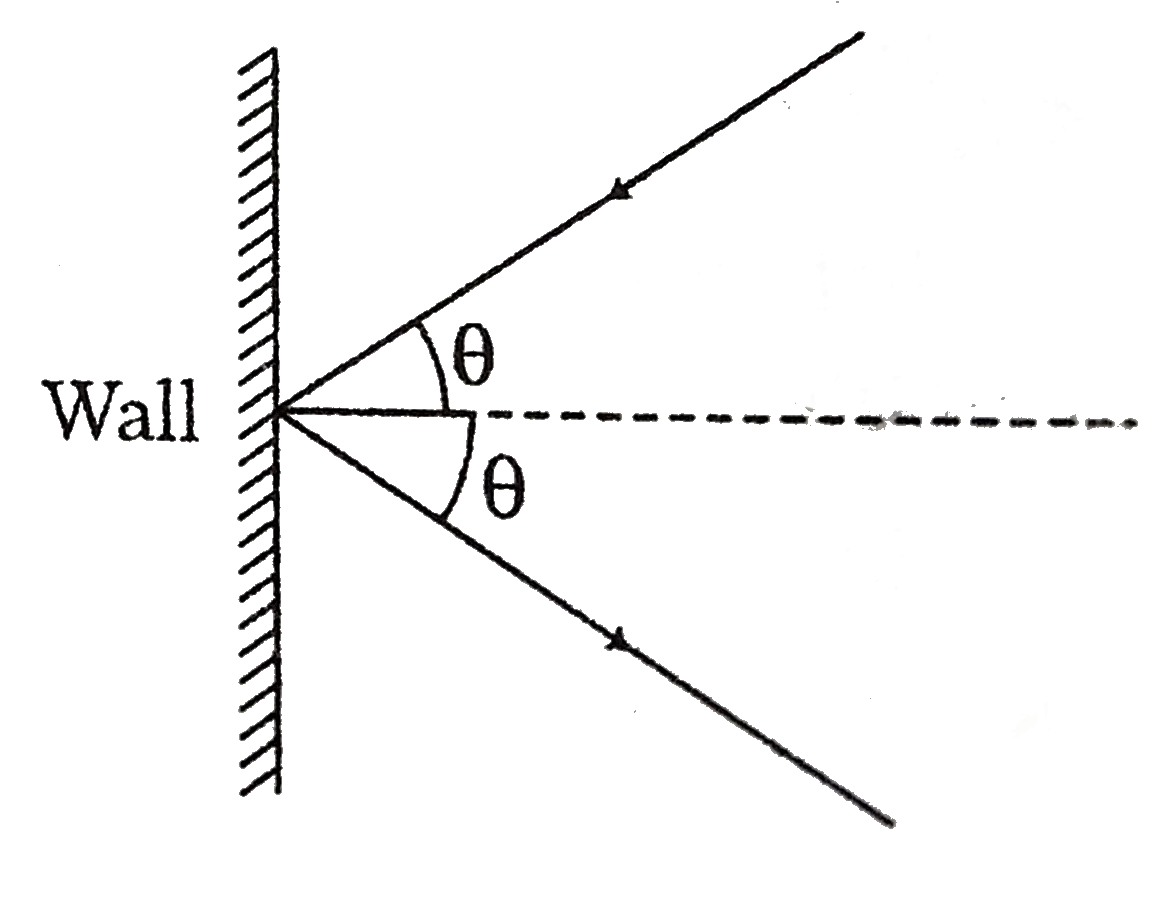If 1022 gas molecules each of mass 10−26kg collide with a surface (perpendicular to it) elastically per second over an area 1m2 with a speed 102m/s, the pressure exerted by the gas molecules will be of the order of :
104N/m2
108N/m2
103N/m2
1016N/m2
The correct Answer is:B
To find the pressure exerted by the gas molecules, we can use the formula for pressure in terms of momentum transfer due to collisions. The pressure P can be calculated using the formula:
P=FA
where F is the force exerted by the gas molecules on the surface, and A is the area over which the force is applied.
Step 1: Calculate the change in momentum per collision
When a gas molecule collides elastically with a surface, it reverses its velocity. The change in momentum Δp for one molecule is given by:
Δp=m(vf−vi)
where:
- m=10−26kg (mass of one molecule),
- vf=−100m/s (final velocity, negative because it reverses direction),
- vi=100m/s (initial velocity).
Thus, the change in momentum is:
Δp=10−26kg×(−100−100)m/s=10−26kg×(−200)m/s=−2×10−24kg m/s
Step 2: Calculate the total momentum change per second
The total number of molecules colliding with the surface per second is N=1022. Therefore, the total change in momentum per second (which is equal to the force F) is:
F=N×Δp=1022×(−2×10−24)=−2×10−2N
The negative sign indicates the direction of the force, but we are interested in the magnitude:
F=2×10−2N
Step 3: Calculate the pressure
The area A is given as 1m2. Thus, the pressure P is:
P=FA=2×10−2N1m2=2×10−2Pa
Step 4: Express the pressure in terms of order of magnitude
The pressure exerted by the gas molecules is of the order of:
P≈2×10−2Pa⟹P is of the order of 10−2Pa
Final Answer
The pressure exerted by the gas molecules will be of the order of 10−2Pa.
---
- m=10−26kg (mass of one molecule),
- vf=−100m/s (final velocity, negative because it reverses direction),
- vi=100m/s (initial velocity).
Topper's Solved these Questions
Similar Questions
1022 particles each of mass 10−26Kg are striking perpendicular on a wall of area 1m2 with speed 104m/s in 1sec. The pressure on the well if collision are perfectly elastic is : (A) 2N/m2 (B) 4N/m2 (C) 6N/m2 (D) 8N/m2
View SolutionFive molecules of a gas have speeds 1, 1, 3, 3, 2 km/s the value of the r.m.s spreed of the gas molecules is
View SolutionFour molecules of gas have speeds 1,2,3 and 4 km/s.The value of the root mean square speed of the gas molecules is
View Solution6×1022 gas molecules each of mass 10−34kg are taken in a vessel of 10 litre. What is the pressure exerted by gas molecules ? The root mean square speed of gas molecules is 100m/s.
View Solution6×1022 gas molecules each of mass 10−24kg are taken in a vessel of 10 litre. What is the pressure exerted by gas molecules? The root mean square speed of gas molecules is 100 m/s.
View SolutionThe mass of hydrogen molecule is 3.32×10−27 kg. If 1023 hydrogen molecules strikes per second at 2 cm2 area of a rigid wall at an angle of 45∘ from the normal and rebound back with a speed of 1000 ms−1, then the pressure exerted on the wall is

View SolutionFor a given gas at 1 atm pressure, rms speed of the molecules is 200m/s at 127∘C. At 2 atm pressure and at 227∘C, the speed of the molecules will be :
View SolutionA body of mass 2kg collides with a wall with speed 100 m/s and rebounds with same speed. If the time of contact was 1/50 second, the force exerted on the wall is
View SolutionCalculate the kinetic energy of a body of mass 2 kg moving with speed of 10 m s−1
View SolutionCalculate the pressure exerted by 1023 gas molecules each of mass 10−22g in a container of volume 1 litre the rms speed is 105cms−1
View Solution
